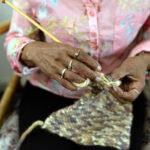Diabetes – what it is and why older people are more at risk
Diabetes is a chronic medical condition that affects millions of people worldwide. In South Africa, it is the second leading cause of death, after tuberculosis.
Of great concern is that many South Africans with diabetes don’t even know they have the disease. It is often never diagnosed, or diagnosed only after several years – by which time it may have caused irreversible damage to many organs of the body.
So what is diabetes?
Type 1 diabetes, which typically develops in early childhood or adolescence, occurs when the body’s immune system mistakenly attacks and destroys insulin-producing cells in the pancreas. As a result, the body is unable to produce insulin. These patients need to inject externally produced insulin into their bodies.
Individuals with type 2 diabetes may produce insulin, but the body cannot use it efficiently. The disease can often be managed by adopting a healthy diet, regular exercise, and weight loss. However, medication may be needed in some cases.
This type of diabetes is more prevalent among adults, with the risk increasing as we get older.
Why are older people more at risk?
- As we age, our metabolism slows down and our bodies may become less efficient in producing or absorbing insulin, the hormone that regulates blood sugar levels. This can lead to insulin resistance – a key factor in the development of type 2 diabetes.
- We tend to be less active physically as we get older, which can lead to weight gain. Being overweight and adopting a sedentary lifestyle increases our chances of developing diabetes. Regular exercise is crucial in preventing the onset of the disease.
- Ageing is associated with a decline in the ratio of muscle mass to body fat in our bodies, another diabetes trigger.
- Over the years, the impact of an unhealthy lifestyle (poor diet, physical inactivity and weight gain) builds up, making us more susceptible to the disease the more time passes.
What happens if diabetes is left untreated?
Early detection of diabetes is crucial. If left untreated, the disease can lead to long-term complications or even death. Among the more serious complications associated with undiagnosed or poorly managed diabetes are:
- Increased risk of heart disease or stroke;
- Chronic kidney disease and kidney failure;
- Blurred vision and blindness;
- Nerve damage (neuropathy) to the feet, necessitating amputation of a toe, foot or part of the leg;
- Increased risk of developing cognitive diseases such as dementia.
Recognise the symptoms of diabetes
- Frequent urination: One of the earliest signs of diabetes is needing to go to the bathroom more often, especially during the night. However, there are many other reasons why you might need to urinate more frequently, including ageing itself.
- Excessive thirst: Diabetes can cause dehydration, leading to an unquenchable thirst. Needing to drink more water, coupled with frequent urination, could be a sign that your body is struggling to regulate glucose levels.
- Unexplained weight loss: Unexpected weight loss should always be investigated. It’s a red flag for many diseases, including cancer and diabetes. If your body is unable to use glucose effectively, it may begin breaking down muscle and fat tissue for energy.
- Fatigue: Diabetes can cause tiredness and weakness owing to the body’s inability to convert glucose into energy efficiently. But tiredness can also be caused by lack of iron and other conditions. If you feel permanently tired, despite getting adequate sleep, it’s worth consulting your health care provider to identify the cause.
- Blurred vision: High blood sugar levels can affect the fluid balance in the eyes, leading to blurry vision. If you experience a sudden change in your eyesight, consult a healthcare professional.
- Slow healing of wounds: Diabetes can impair the body’s ability to heal, resulting in slow recovery from cuts and bruises. Slow healing makes wound infection more likely, which can have serious repercussions.
- Numbness or tingling in hands and feet: Over time, diabetes can damage nerves, leading to peripheral neuropathy. If you feel tingling, numbness or pain in your feet and hands, it’s crucial to seek medical advice.
- Recurrent infections: Diabetes can weaken the immune system, making you more susceptible to infections. Recurrent infections, particularly in the skin or urinary tract, may be indicative of an underlying issue with blood sugar regulation.
Blood sugar testing
Since symptoms may not be obvious and undiagnosed diabetes has such serious consequences, it is recommended that you have your blood sugar tested at least twice a year.
Blood sugar testing can be done by your doctor, or at many pharmacies including most branches of Clicks. It’s a simple test with instant results that could improve the quality of our life or even save it.






 Concern and confusion over SASSA Old Age Grant payments
Concern and confusion over SASSA Old Age Grant payments Vote for us in the KZN Top Brand Award
Vote for us in the KZN Top Brand Award Men’s health – signs older men shouldn’t ignore
Men’s health – signs older men shouldn’t ignore Tafta commemorates Elder Abuse Awareness Day – staff say ‘No’ to elder abuse
Tafta commemorates Elder Abuse Awareness Day – staff say ‘No’ to elder abuse Elder Abuse – it’s not always what you think
Elder Abuse – it’s not always what you think Holiday fun that doesn’t break the bank – inexpensive activities for grandparents
Holiday fun that doesn’t break the bank – inexpensive activities for grandparents Old school ‘Granny Crafts’ promote mental health
Old school ‘Granny Crafts’ promote mental health Tafta Golf Day at Cotswold, a swinging success!
Tafta Golf Day at Cotswold, a swinging success! Come visit us – Tafta Open Days this May!
Come visit us – Tafta Open Days this May! Sleep Quantity vs. Sleep Quality – what matters most for healthy ageing?
Sleep Quantity vs. Sleep Quality – what matters most for healthy ageing?